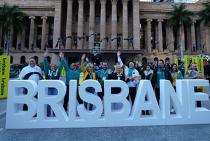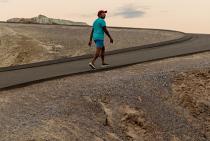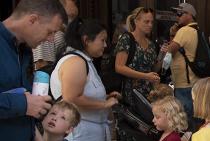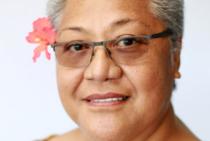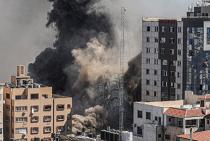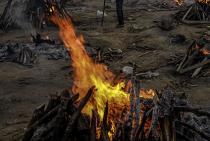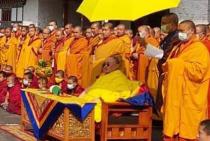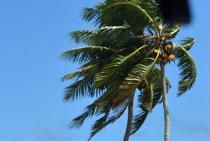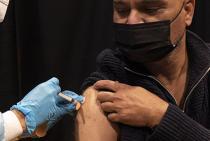New York Times reporting: Simone Biles’s withdrawal was a stunning turnabout for the Americans, who had dominated the gymnastics team events in Tokyo, and it came hours after another superstar athlete, Naomi Osaka, was upset in the third round of the women’s singles tennis tournament by a player with a far lower ranking. Both athletes came into the Olympics, expected to bring home gold medals and to fulfil the obligations of a global celebrity, then buckling under the high demands of the Olympic stage. But Biles, Osaka and others in their generation have been vocal about putting their mental health first.
You are here
Results for World
Wednesday 28 July 2021
Tokyo, Japan
Saturday 24 July 2021
 Premium content
Premium content
Tokyo, Japan
New York Times reporting and photos: The athletes marched into the arena masked and waving exuberantly. Dancers in pastel costumes and hats clapped and waved their arms in the air to whip up excitement. But there were no fans and no cheering audience — only row upon row of mostly empty seats stretching into the reaches of the vast Olympic Stadium in central Tokyo.
Thursday 22 July 2021
 Premium content
Premium content
Tokyo, Japan
New York Times reporting: As the Summer Olympics stumbled to an unsteady start on Wednesday, the International Olympic Committee took a big step toward crystallizing its long-term future by voting to officially select Brisbane, Australia, as host of the Summer Games in 2032.
Tuesday 20 July 2021
Tokyo, Japan
New York Times reporting: The opening ceremony is Friday and the first competitions are Wednesday. But organizers of the Tokyo Olympics, delayed one year by the pandemic, are struggling to manage public anxiety about the Games after a cluster of coronavirus cases that threaten to overshadow the festivities. As about 20,000 athletes, coaches, referees and other officials have poured into Japan in recent days, more than two dozen of them have tested positive for the virus, including three cases within the Olympic Village.
Tuesday 13 July 2021
New York, USA
New York Times reporting: California’s Death Valley reached 130 degrees Farenheit (54.44 Celcius) and matched a previous record set less than a year ago, in August 2020 — it might be the highest temperature ever recorded on earth, barring a disputed 134-degree reading from 1913. The scorching temperatures from the West’s third heat wave of the summer, compounding already dry conditions from a drought deepened by climate change, fuelled quick-spreading wildfires and fears of power outages over the weekend. The sweltering conditions reached into places that rarely see triple digits.
Wednesday 7 July 2021
Sydney, Australia
New York Times reporting: Three days after the emergence of a rare COVID-19 case in Sydney, around 40 friends gathered for a birthday party. Along with cake and laughter, there was a hidden threat: One of the guests had unknowingly crossed paths with that single COVID case, an airport driver who had caught the Delta variant from an American aircrew. Two weeks later, 27 people from the party have tested positive. And the seven people at the gathering who were not infected? They were all vaccinated. By Damien Cave.
Wednesday 26 May 2021
 Premium content
Premium content
Wellington, New Zealand
New York Times reporting: More than 50,000 New Zealanders have flocked home during the pandemic, offering the country a rare opportunity to win back some of its best and brightest. The question is how long the edge will last. The Ardern government has announced no specific measures aimed at retaining citizens who return. But it is using its border shutdown as a moment to “reset” its immigration priorities, saying last week that it would loosen controls for wealthy investors while curtailing temporary visas for the migrants the country has long relied on as citizens moved away.
Tuesday 25 May 2021
 Premium content
Premium content
New York, USA
New York Times reporting: Fiame Naomi Mata’afa walked toward Samoa’s beehive-shaped Parliament House on Monday morning intending to be sworn in as the first female prime minister in the Pacific Island nation’s 56-year history. What she and her fellow party members found instead were locked doors. The speaker of parliament had issued orders to keep them out. And so deepened a constitutional crisis that has convulsed this long-stable nation and thrown into doubt whether Mata’afa, whose party won the April 9 election, would actually take office.
Thursday 20 May 2021
 Premium content
Premium content
Melbourne, Australia
New York Times reporting: When Australian officials announced last week that the country was unlikely to fully reopen its borders until mid-2022 because of the coronavirus, the backlash immediately began building. Critics warned that Australia risked becoming a “hermit nation.” Members of the Australian diaspora who had been struggling to return home for months saw it as another blow. The announcement drew dire warnings from business, legal and academic leaders. But polls show that keeping the borders shut is a popular idea.
Tuesday 18 May 2021
 Premium content
Premium content
New York, USA
New York Times reporting: The United States will send 20 million coronavirus vaccine doses in June to countries struggling against the pandemic, answering calls that the Biden administration isn’t doing enough to help countries that face dire shortages of vaccines and other treatments. This was after WHO director general, Dr. Tedros Adhanom Ghebreyesus called for well-supplied nations to supply harder-hit countries, and for vaccine developers and manufacturers to hasten delivery of hundreds of millions of doses to COVAX.
Monday 17 May 2021
 Premium content
Premium content
Gaza City
New York Times reporting: Diplomats and international leaders were unable Sunday to mediate a cease-fire in the latest conflict between Israel and Hamas, as Prime Minister Benjamin Netanyahu of Israel vowed to continue the fight and the United Nations Security Council failed to agree on a joint response to the worsening bloodshed. The diplomatic wrangling occurred after the fighting — the most intense seen in Gaza and Israel for seven years — entered its deadliest phase yet.
Monday 10 May 2021
 Premium content
Premium content
Tokyo, Japan
New York Times reporting: Japan on Friday extended a state of emergency in Tokyo and other regions until the end of May to contain a surge of coronavirus cases, casting further doubt on the country’s ability to safely host the Summer Olympics, which are scheduled to begin in 11 weeks. Prime Minister Yoshihide Suga made the announcement at a meeting of the government’s coronavirus task force, saying that the measures were necessary because infections remain at a “high level, mainly in large cities.”
Tuesday 4 May 2021
 Premium content
Premium content
Sydney, Australia
New York Times Reporting: About 8,000 Australians are affected by an unprecedented travel ban that began on Monday, prompted by India’s record-breaking COVID outbreak. It is believed to be the first time that Australia has made it a criminal offence for its own citizens and permanent residents to enter the country, with a threat of jail time or large fines. Families are separated and Indian-Australians are outraged.
Thursday 29 April 2021
 Premium content
Premium content
London, United Kingdom
People who have been vaccinated with a single dose of either the Oxford-AstraZeneca or Pfizer-BioNTech vaccines were 65% less likely to get a new Covid infection, a UK study has found. The chances of becoming infected by COVID (SARS-CoV-2) fell sharply after a first dose. However, some people can still get Covid after being vaccinated but the ongoing transmission is reduced.
Wednesday 28 April 2021
 Premium content
Premium content
New Delhi, India
New York Times reporting: Crematories are so full of bodies, it’s as if a war just happened. Fires burn around the clock. Many places are holding mass cremations, dozens at a time, and at night, in certain areas of New Delhi, the sky glows. Sickness and death are everywhere. India is recording more infections per day — as many as 350,000 — than any other country has since the pandemic began. What we had been fearing during last year’s first wave, and which never really materialized, is now happening in front of our eyes: a breakdown, a collapse, a realization that so many people will die. By Jeffrey Gettleman.
Monday 19 April 2021
 Premium content
Premium content
Thimphu, Bhutan
New York Times reporting: As of Saturday, Bhutan, a Buddhist kingdom that has emphasized its citizens’ well-being over national prosperity, had administered a first vaccine dose to more than 478,000 people, more than 60% of its population. The Health Ministry said this month that more than 93% of eligible adults had received their first shots. That rate was ahead of those of the United Kingdom and the United States, more than seven times that of neighbouring India and nearly six times the global average. Bhutan’s health minister, attributed its success to “leadership and guidance” from the country’s king, public solidarity, a general absence of vaccine hesitancy, and a primary health care system that “enabled us to take the services even to the most remote parts of the country.”
Tuesday 13 April 2021
New York, USA
New York Times reporting: The AstraZeneca-Oxford vaccine has been deployed against COVID-19 in at least 115 countries, some of them for several months now. But it was not until a few cases of a rare blood-clotting disorder — some fatal — emerged within the past month or so that many European nations began to rethink its use across all age groups. Public health experts, however, have expressed concern that publicity surrounding the rare vaccine-related reactions will fuel hesitancy. They continue to emphasize that the AstraZeneca-Oxford vaccine’s benefits far outweigh the risks. In many nations, it is the only vaccine available.
Thursday 8 April 2021
 Premium content
Premium content
New York, USA
New York Times reporting: How does a country deal with climate disasters when it is drowning in debt? Not very well, it turns out. Especially not when a global pandemic clobbers its economy. Take Belize, Fiji and Mozambique. Vastly different countries, they are among dozens of nations at the crossroads of two mounting global crises that are drawing the attention of international financial institutions: climate change and debt.
Wednesday 31 March 2021
 Premium content
Premium content
Brussels, Belgium
New York Times reporting: Citing what they call “the biggest challenge to the global community since the 1940s,” the leaders of more than two dozen countries, the European Union and the World Health Organization on Tuesday floated an international treaty to protect the world from pandemics. The current pandemic is “a stark and painful reminder that nobody is safe until everyone is safe,” the leaders write. The suggested treaty is an acknowledgment that the current system of international health institutions, symbolized by the relatively powerless WHO, a U.N. agency, is inadequate to the problem.
Tuesday 16 March 2021
 Premium content
Premium content
New York, USA
New York Times reporting: The coronavirus must have infected someone with a weak immune system, allowing it to adapt and evolve for months into far more contagious variants, experts hypothesize. If true, the idea has implications for vaccination programs, particularly in countries that have not yet begun to immunize their populations, especially those with diabetes and other health conditions. People with compromised immune systems — such as cancer patients — should be among the first to be vaccinated, said a virus expert. The faster that group is protected, the lower the risk that their bodies turn into incubators for the world’s next supercharged mutant.




